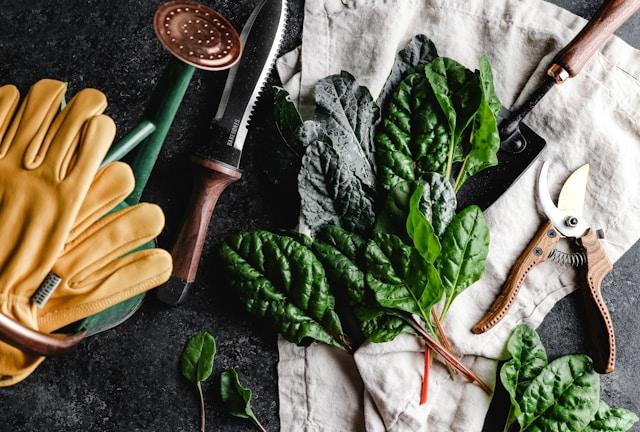إعلان مُمول
The Ultimate Buying Guide to Specialty Garden Tools: What You Need and Why It Matters

Gardening is more than planting seeds and pulling weeds; it’s a craft, a science, and for many, a deeply personal ritual. Whether you're cultivating a backyard oasis or managing raised beds on a rooftop, the tools you use shape the experience. While basic tools like shovels and rakes get the job done, specialty garden tools elevate your efficiency, precision, and enjoyment.
This guide explores what specialty garden tools are, why they matter, and how to choose the right ones for your gardening goals. Let’s dig in.
🌱 What Are Specialty Garden Tools?
Specialty garden tools are purpose-built instruments designed for specific gardening tasks that go beyond general use. Unlike standard tools, they offer:
-
Precision for delicate tasks like pruning bonsai or transplanting seedlings
-
Ergonomics for reducing strain during repetitive motions
-
Efficiency in tasks like soil testing, aeration, or bulb planting
-
Durability for long-term use in demanding conditions
These tools are often favored by experienced gardeners, landscapers, and horticulturists—but they’re just as valuable for beginners who want to garden smarter, not harder.
🧤 Why Specialty Garden Tools Matter
Investing in specialty tools isn’t just about convenience; it’s about results. Here’s why they’re worth considering:
1. Better Plant Health
Using the right tool for the job minimizes damage to roots, stems, and soil structure. For example, a root pruner ensures clean cuts that promote healing, while a soil probe helps you avoid overwatering.
2. Time Savings
Specialty tools streamline tasks. A bulb planter, for instance, lets you plant dozens of bulbs in minutes—no need to dig individual holes with a trowel.
3. Reduced Physical Strain
Ergonomic designs, like long-handled weeders or cushioned grips, protect joints and muscles. This is especially important for older gardeners or those with mobility concerns.
4. Professional Results
Whether you're shaping topiary or grafting fruit trees, specialty tools help you achieve cleaner, more consistent outcomes.
🪴 Categories of Specialty Garden Tools
Let’s break down the most useful types of specialty garden tools by category, with buying tips for each.
✂️ Pruning & Cutting Tools
Examples: Bypass pruners, loppers, grafting knives, bonsai shears
Use Case: Shaping plants, removing dead growth, harvesting herbs
Buying Tips:
-
Choose bypass blades for live stems; anvil blades for dead wood
-
Look for replaceable blades and rust-resistant materials
-
Consider hand size and grip strength—ergonomic handles make a difference
Pro Pick: Japanese bonsai shears for precision pruning in tight spaces
🌾 Soil & Bed Preparation Tools
Examples: Soil probes, aerators, broadforks, compost thermometers
Use Case: Testing pH, improving drainage, loosening compacted soil
Buying Tips:
-
Match tool depth to your garden bed (e.g., shallow aerators for raised beds)
-
Stainless steel probes offer durability and accurate readings
-
Broadforks are ideal for no-till gardeners seeking deep aeration
Pro Pick: A digital soil tester with moisture, pH, and light sensors
🌷 Planting Tools
Examples: Bulb planters, dibbers, seed sowers, transplanting trowels
Use Case: Precision planting, spacing, and seed distribution
Buying Tips:
-
Look for depth markers to ensure consistent planting
-
Spring-loaded bulb planters speed up mass planting
-
Dibbers with ergonomic handles reduce wrist strain
Pro Pick: Adjustable seed sowers for even distribution across rows
🌿 Weeding & Cultivation Tools
Examples: Hori-hori knives, stirrup hoes, long-handled weeders
Use Case: Removing weeds, cultivating soil, edging beds
Buying Tips:
-
Hori-hori knives double as diggers and weeders—look for models with serrated edges
-
Stirrup hoes are great for slicing weeds just below the surface
-
Long-handled tools reduce bending and back strain
Pro Pick: Stainless steel hori-hori with depth gauge and leather sheath
🧪 Specialty Maintenance Tools
Examples: Grafting kits, irrigation timers, plant support systems
Use Case: Advanced care, automation, and structural support
Buying Tips:
-
Grafting kits should include multiple blade types and tape
-
Timers with moisture sensors help automate watering
-
Look for adjustable plant supports that grow with your plants
Pro Pick: Modular trellis systems for vertical gardening
🛒 How to Choose the Right Specialty Garden Tools
Here’s a consultative framework to help you select tools based on your gardening style and goals:
| Gardening Style | Recommended Specialty Tools | Why It Works |
|---|---|---|
| Raised Bed Gardening | Soil probes, ergonomic weeders, bulb planters | Compact tools with precision and comfort |
| Container Gardening | Transplanting trowels, seed sowers, moisture meters | Tools for small spaces and root care |
| Ornamental Gardening | Bonsai shears, topiary clippers, grafting knives | Precision tools for shaping and aesthetics |
| Edible Gardening | Broadforks, irrigation timers, harvesting knives | Tools for soil health and efficient harvesting |
| No-Till Gardening | Broadforks, stirrup hoes, compost thermometers | Tools that preserve soil structure |
💡 Bonus: Specialty Tool Kits vs. Individual Purchases
Should you buy tools individually or invest in a specialty kit?
✅ Go for Kits If:
-
You’re starting fresh and want a cohesive set
-
You’re gifting tools to a new gardener
-
You want bundled savings and matching ergonomics
✅ Go Individual If:
-
You need to replace or upgrade specific tools
-
You have niche gardening needs (e.g., bonsai, vertical gardening)
-
You prefer premium tools over bundled basics
📈 Where to Buy Specialty Garden Tools
Here are a few trusted sources for quality specialty garden tools:
-
Local garden centers: Great for hands-on testing and expert advice
-
Online retailers: Amazon, Gardener’s Supply, Lee Valley Tools
-
Specialty brands: Felco (pruners), Nisaku (hori-hori), Corona Tools
Look for reviews, warranties, and return policies—especially for high-ticket items.
🧭 Final Thoughts: Invest in Tools That Grow With You
Specialty garden tools aren’t just accessories—they’re strategic investments in your gardening journey. Whether you're optimizing for comfort, precision, or productivity, the right tools make every task more rewarding.
Start by identifying your biggest pain points in the garden. Is it planting bulbs efficiently? Managing soil health? Reducing strain? Then match those needs with tools designed to solve them.
Gardening is a lifelong learning process. With specialty tools in hand, you’re not just tending to plants—you’re cultivating mastery.







